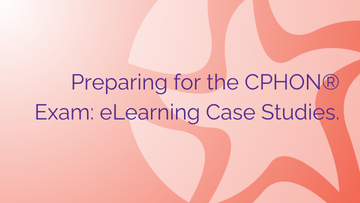Welcome to Preparing for the CPHON® Exam: eLearning Case Studies
This resource has been developed to be used together with the Essentials of Pediatric Hematology/Oncology Nursing: A Core Curriculum, 4th Edition. This program includes eight modules that start with a set of reading assignments. After reading the assignments, participants review case studies and practice answering questions. At the end of the program, participants can take a scored practice post-test and review their correct and incorrect answers to continuously improve their score and confidence level.
The first module reviews basic content about cancer and provides advice about how to prepare for the CPHON® exam and strategies that can be used while taking the test. The other seven modules each focus a particular type of cancer. These modules provide:
- Case studies about children who had that type of cancer
- Questions about that cancer type interspersed within the case studies
- Plus additional practice questions about each cancer type!
Module List
- Introduction and Oncology & Hematology Basics
- Leukemia Cases
- Lymphoma Cases
- Brain Tumor Case
- Neuroblastoma Cases
- Solid Tumor Cases
- Sickle Cell Disease
- Other Hematology Cases
At the end of the program, there is a post-test that you can take as many times as you want.
Disclaimer: ONCC does not develop, provide, sponsor, or endorse any review courses. Participation in a review course is not required to apply for or take an ONCC certification examination. Participation in a review course does not guarantee a passing score on an ONCC certification examination.
Target Audience Description
The target audience for this course is the same as the target audience for the CPHON® certification. For more information, go to https://www.oncc.org/certifications/certified-pediatric-hematology-oncology-nurse-cphon.
Length
15 hours, including 7 to 8 hours of reading assignments
Learning Objectives
The Learning Objectives for this program are the based on the CPHON® test blueprint, with the addition of a test-taking strategy objective at the end of this list. For more information about the test content outline, see https://www.oncc.org/files/CPHONTestContentOutline.pdf.
For pediatric, adolescent and young adult patients, nurses will be able to:
- Describe aspects of psychosocial adaptation and health maintenance of the patient and family during the acute/chronic disease process
- Identify the diagnosis, treatment and outcomes for oncologic disorders
- Identify the diagnosis, treatment and outcomes for hematologic disorders
- Recognize and anticipate late effects and survivorship issues associated with treatment for oncologic and hematologic disorders
- Evaluate the classifications of chemotherapeutic agents and their mechanisms of action
- Describe administration guidelines, monitoring and precautions for antineoplastic chemotherapeutic and biotherapeutic agents.
- Identify supportive care interventions related to side effects and toxicities of therapy
- Recognize and anticipate hematologic and oncologic emergencies and important nursing interventions for each
- Describe the philosophy, core concepts, and challenges of palliative and end of life care
- Utilize best practices for studying and test-taking
Preparing for the CPHON Exam: eLearning Case Studies Project Team Members
Project Leader
Terri L. Boyce, DNP APRN CPNP-AC CPHON®
Board Liaison
Dyane Bunnell, MSN RN AOCNS CPON®
Content Developers
Janet K. Cavitt, BSN RN CPON®
Colleen M. Nixon, MSN RN CPHON®
Carol Rossetto, CPNP CPON®
Anne Marie Sterk, MSN RN CPON®
Anthony Yost, CPHON®
Reviewers
Erin Friedman, BSN RN CPHON®
Amy Haskamp, MSN RN PCNS CHPPN CPON®
Janice Nuuhiwa, MSN APN/CNS NPD-BC CPHON®
Mary Lynn Rae, MSN RN CPHON®
Kristin M. Belderson, DNP MS RN CPON®
Joan O’Hanlon Curry, MS RN CPNP CPON®

